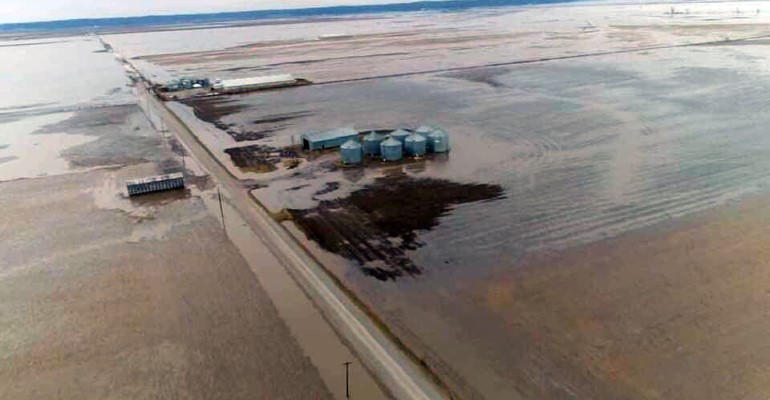Grain losses mount, while Congress could be voting on disaster aid bill as soon as week of March 25.

Farmers have been affected by record flooding in the upper Mississippi River and Missouri River basins, including in Minnesota and Iowa as well as Nebraska. President Donald Trump has already declared a federal disaster in Nebraska, and Iowa is expected to follow suit soon with an emergency request.
The National Oceanic & Atmospheric Administration forecasts an elevated risk for flooding through May. Nearly two-thirds of the lower 48 states face an elevated risk of flooding, with the potential for major or moderate flooding in 25 states.
In a statement March 21, Agriculture Secretary Sonny Perdue said the U.S. Department of Agriculture will do all it can at the state, regional and county levels to respond and provide assistance. “While farmers and ranchers in the area are resilient, the pain is real. We will do everything in our power at USDA to be as helpful as we possibly can,” Perdue said.
Iowa, Nebraska, South Dakota and Wisconsin have all declared states of emergency related to the recent bomb cyclone and related flooding. The U.S. Grains Council (USGC) reported in its "Global Update" on March 21 that flooding has taken a significant toll on southwestern Iowa. Significant flooding is also affecting other parts of the U.S. Corn Belt, including Nebraska, South Dakota and Wisconsin.
USGC director Duane Aistrope said in Fremont County, Iowa, farmers estimate that they have lost roughly 1.34 million bu. of corn and 390,000 bu. of soybeans contained in farmer-owned storage along the Missouri River bottoms. That estimate does not include additional elevators with significant bushels stored in bins and ground storage along the river. Politico reported that Sen. Joni Ernst (R., Iowa) said Fremont County alone has lost $7 million worth of grain due to the flooding, per county estimates. The lost grain is not insured.
The "Global Update" highlighted USGC chairman Julius Schaaf and Aistrope -- neighboring farmers located near Randolph, Iowa, southeast of Omaha, Neb., and a short 20 miles east of the Missouri River. While neither individual farms directly on the Missouri River bottom, both have farmland along the West Nishnabotna River, which joins with an eastern branch before dumping into the Missouri River further south in Hamburg.
Levees in the area continue to break. Schaaf and Aistrope sent trucks and generators down to help friends attempt to unload grain bins located on the Missouri River. Operations halted as levees broke and conditions became too dangerous to continue. The next day, the crew tried again to move out more grain, putting spotters on top of the levees.
“We couldn’t unload it fast enough,” Aistrope said, noting that the team managed to move about 42,000 bu. of corn and soybeans out of his neighbor’s newly built bins.
USGC said the impact is devastating both in southwestern Iowa and across the Corn Belt. The Nebraska Corn Board currently estimates the potential impact to crop farmers across Nebraska at around $440 million. Impacts on overall acres continue to be assessed.
More help may be on its way. The Senate is aiming to vote on a $14.2 billion House-passed disaster aid bill, H.R. 268, when both chambers return from recess the week of March 25. Federal aid for flooded Farm Belt states such as Nebraska — which is facing an estimated $1.36 billion in damage — could be in the mix as lawmakers negotiate a final package.
Transportation impact
Growth Energy chief executive officer Emily Skor called on the U.S. Department of Transportation to help expedite rail delivery of biofuels amid historic flooding. The recent flooding has not only had devastating effects on residents but has delayed the transportation of critical supplies of biofuels, which, in turn, could affect consumer fuel costs.
In her letter to Transportation Secretary Elaine Chao, Skor said: “While we certainly understand and appreciate that these rail issues have been caused by the calamitous flooding currently occurring in the Midwest, it is imperative that all possible actions be taken by the nation’s railroads to ensure that these critical fuel supplies are immediately prioritized and reach markets as quickly as possible. Further delays could not only impact our industry but could also ultimately increase fuel costs for American drivers.”
Mike Steenhoek, executive director of the Soy Transportation Coalition, noted that the 256-mile stretch of the lower Mississippi River between Baton Rouge, La., and the Gulf of Mexico accounts for 60% of U.S. soybean exports and 59% of U.S. corn exports – the leading export region for both commodities. Due to the increased volume of water that has made its way to this region, a significant increase in sediment accumulation has occurred, causing ocean vessels of soybeans, grains and other commodities to have to be loaded lighter than normal. According to USDA, 486 barges were unloaded in the New Orleans area during the week ending March 9; this is the lowest amount since June 2017.
Steenhoek said April is often the leading month for northbound barge shipments of fertilizer. “We often focus on the use of barges for the export of soybeans and grain, but barge transportation is widely used for inputs like fertilizer. These deliveries will likely be impeded,” he said.
About the Author(s)
You May Also Like




.png?width=300&auto=webp&quality=80&disable=upscale)
